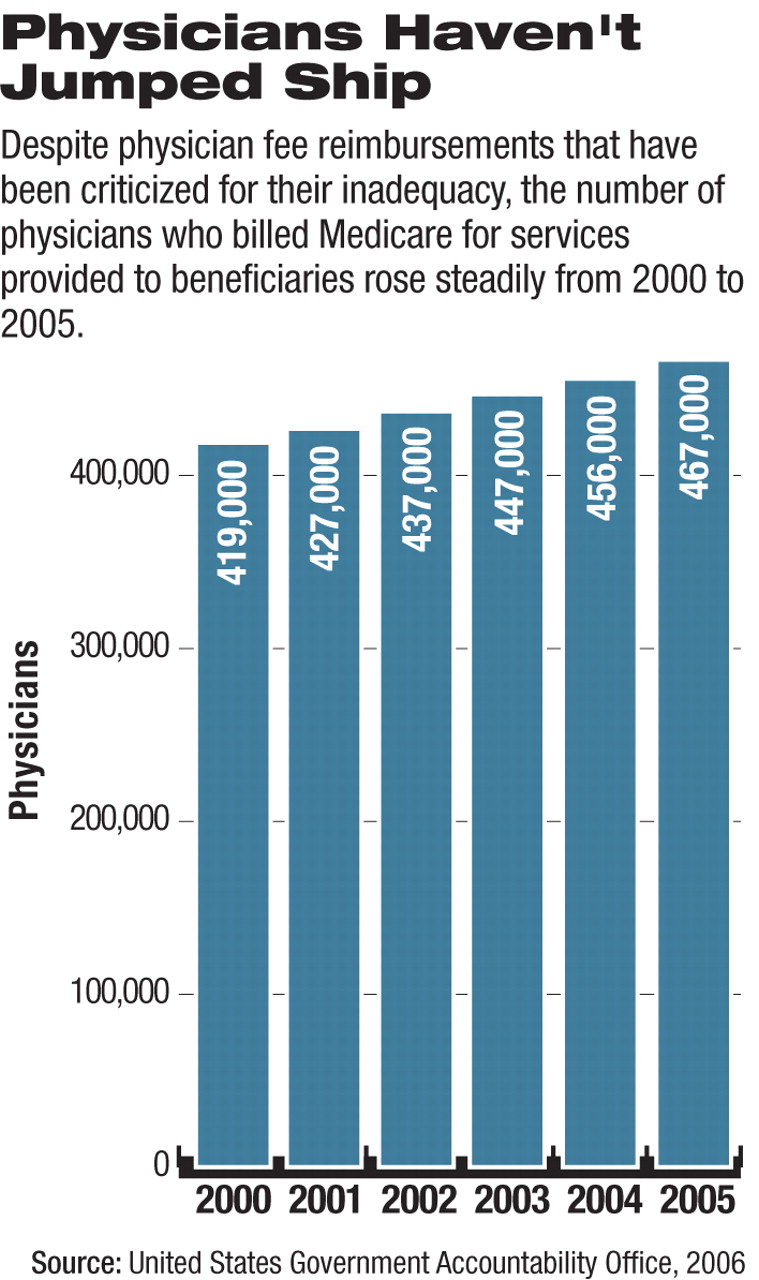As APA and other physician organizations build momentum on Capitol Hill to halt the latest scheduled cut to Medicare payments to physicians, new research questions whether reduced or stagnating reimbursements have had much impact on physicians' willingness to participate in the program.
The Government Accountability Office (GAO) reported in late July that its study of physician participation in the Medicare program following the reduced and stagnant reimbursements allowed under the program in recent years indicated that few physicians stopped participating. Moreover, said the GAO, there was little evidence to suggest that beneficiaries had difficulty accessing care.
The study was mandated by the 2003 Medicare reform law after the Medicare physician fee formula underwent a 5.4 percent reduction to help moderate rapid spending increases. APA and other physician advocacy organizations have long been concerned that inadequate reimbursements cause physicians to drop out of the Medicare program, thereby hurting seniors' access to care.
Physicians Not Deterred
The GAO study, which used records and surveys compiled by the Centers for Medicare and Medicaid Services (CMS), found that the number of physicians billing Medicare for services and the proportion of services for which Medicare's fees were accepted as payment in full increased during the study period, from April 2000 to April 2005. Less than 4 percent of physicians said that they did not accept any new Medicare patients in that time.
In addition, the use of physician services generally increased nationwide in the study period. According to the AMA, however, this finding should not be interpreted as an improvement in access. Increases in the use of physician services could result from beneficiaries' growing sicker, the substitution of physician services for care in the hospital or other settings, or beneficiaries' taking advantage of new Medicare-covered services.
The percentage of beneficiaries reported having major difficulty in accessing care remained relatively constant over the study period at about 7 percent. Beneficiaries more likely to have difficulties accessing care were those who rated their health as poor, were under 65 and disabled, were not white, and had no supplemental health insurance or had supplemental insurance from Medicaid.
The study did not gauge the impact of future cuts, which could be significant. A recent AMA survey reported that 45 percent of physicians said they would decrease the number of new Medicare patients they accepted or stop taking them altogether if a planned 5 percent physician reimbursement cut goes into effect on January 1, 2007.
“Medicare cannot continue to provide seniors with high-quality health care while slashing reimbursements to the physicians who care for them,” said Cecil Wilson, M.D., chair of the AMA Board of Trustees, in a statement.
Moreover, the study did not look at access to care by medical specialty. According to Ellen Jaffe, Medicare specialist in APA's office of Healthcare Systems and Financing, psychiatrists seem to be opting out of Medicare participation in greater numbers than are physicians in general. Thus, while beneficiaries in general may not be experiencing an increase in access difficulties, she noted, psychiatric patients who rely on Medicare may already be confronting such problems.
The GAO findings appear to run counter to findings reported in March by MedPAC, the commission that advises Congress on Medicare. For example, MedPAC found that 25 percent of Medicare patients seeking a new primary care physician have trouble getting an appointment.
Congress Urged to Act Quickly
The GAO report was released as Congress was considering a reduction of 4 percent to 5 percent to Medicare's physician reimbursement fees. Lawmakers last year blocked a planned 4.4 percent reduction and now face a similar decision.
The annual consideration of cuts stems from the 1997 Balanced Budget Act, which created the sustainable growth rate system that sets a target for Medicare payments to doctors that factors in inflation (see story below). When spending increases exceed economic growth, payments to physicians are to be cut. Unchanged, the system will require approximately 5 percent annual cuts in physician payments through 2016 to meet program spending targets, according to federal estimates.
Those cuts are unlikely to occur, however, because lawmakers fear that payment reductions could add to the record increases in Medicare premiums and drive physicians from the program.
In late July, Rep. Michael Burgess (R-Texas), an obstetrician, introduced the Medicare Physician Payment Reform and Quality Improvement Act of 2006 that would raise Medicare physician fees about 2.8 percent next year. His proposal would rely more on the inflation measure known as the Medicare economic index.
“When I practiced medicine, I remember the financial strain when providing Medicare services cost double what I was being reimbursed,” he said last month at a hearing of the Energy and Commerce Subcommittee on Health.
The AMA urged Congress to end consideration of the issue for the year by acting on the issue before Congress recesses in October. Observers said members of both political parties are open to a revision of the payment system to avoid the planned cuts, but there is less unity about the source of funds for a change that would cost billions of dollars.
The GAO research was based in part on reviews of Medicare claims filed from 2000 through 2004 and CMS surveys that asked patients whether finding a personal provider was “no problem,” “a small problem,” or “a big problem.”
The GAO report is posted at<www.gao.gov/new.items/d061008t.pdf>.▪

